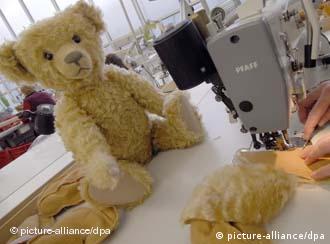Results 1 to 2 of 2
Thread Information
Users Browsing this Thread
There are currently 1 users browsing this thread. (0 members and 1 guests)
-
07-06-2008, 06:30 PM #1Senior Member


- Join Date
- May 2007
- Location
- South West Florida (Behind friendly lines but still in Occupied Territory)
- Posts
- 117,696
German Companies Eye Moving Production Back Home
German Companies Eye Moving Production Back Home
Großansicht des Bildes mit der Bildunterschrift:

He won't be made in China in the future
German toymaker Steiff announced this week that it is relocating production to Germany from China. Experts disagree on whether this is an example of a new trend, or simply the exception to the rule.
The flight of German businesses has long been a favorite topic among hosts of the country's political talk shows. Experts and politicians keep pointing out that high labor costs and tax burdens force companies to relocate abroad. Asia attracts entrepreneurs who plan ahead, and China's the big market of the future, they say.
That's why many eyebrows were raised in Germany this week when toymaker Steiff announced that it will be shutting down production in China by 2009. The German Engineers' Association (VdI) followed suit by announcing that Steiff was not the exception. According to a study commissioned by VdI, almost one in five companies that relocated production abroad returns to Germany after a few years.
While every 11th company still moves production to other countries, it's a receding trend, according to VdI officials.
"The numbers show that the 'made in Germany' label continues to be a quality seal," Bruno O. Braun, VdI's president, said in a statement.
China still attractive
Bildunterschrift: Großansicht des Bildes mit der Bildunterschrift: Many German firms still like to invest in China
It's a view that's not shared by Volker Treier, the chief economist of the Association of German Chambers of Industry and Commerce (DIHK), who said that the VdI numbers were "clearly too high." Treier added that there have always been companies that have returned production to Germany. The number has remained relatively steady over the last few years.
Treier bases his view on an annual DIHK survey among 8,000 companies.
"There's still a strong trend to invest abroad -- which shouldn't be confused with moving production abroad," he said, adding that a third of those companies surveyed still see China as a prime market.
Saying that an increasing number of companies is leaving China is wrong, Treier said.
While companies indicated that the need to move production abroad declined between 2003 and 2007, the rise of the euro has again made production facilities abroad more attractive for those firms that want to sell their goods in dollars, Treier said.
Short-sighted flight
Bildunterschrift: Großansicht des Bildes mit der Bildunterschrift: It takes time to build networks abroad
He added that shutting down production abroad was a short-sighted reaction on the part of some firms.
"Start-up periods, the need for local networks or costs for supervision and quality controls are often ignored," Treier said.
He added that some companies are also unpleasantly surprised by the lack of skilled workers at a foreign location. Product safety is especially a concern for companies in China and a reason to leave the market again, Treier said.
This seems to have been the case with toymaker Steiff, where officials cited a lack of quality and long transportation routes as the main reason for returning to Germany. They also said that employees would quickly change jobs if they found work elsewhere that was paid slightly better.
Rising energy costs could also become a reason for companies to return home in the future. While computer and car producers are currently still getting parts where they are cheapest and ship, fly or truck them to where they need them for assembly, transportation costs may end up playing a bigger role in the equation in the future.
Steffen Leidel (win)
http://www.dw-world.de/dw/article/0%2C2 ... %2C00.htmlJoin our efforts to Secure America's Borders and End Illegal Immigration by Joining ALIPAC's E-Mail Alerts network (CLICK HERE)
-
07-06-2008, 07:59 PM #2
There is still a lot of unemployment in East Germany
I support enforcement and see its lack as bad for the 3rd World as well. Remittances are now mostly spent on consumption not production assets. Join our efforts to Secure America's Borders and End Illegal Immigration by Joining ALIPAC's E-Mail Alerts network (CLICK HERE)


 LinkBack URL
LinkBack URL About LinkBacks
About LinkBacks




 Reply With Quote
Reply With Quote

Ukraine-Israel Bill Secretly Funds Biden's invasion!
04-24-2024, 12:01 PM in illegal immigration Announcements